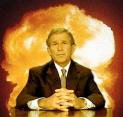
A friend at work who happens to be a Republican said an odd thing to me the other day.
"I guess you're feeling pretty good about all the trouble Bush is in right now," he said. I felt a little insulted, since he was attributing what I consider a Republican character trait to me - petty political vindictiveness. It always seemed to me that the GOP was the party that would stop at nothing to destroy political opponents - ala Bill Clinton, whose own "scandals" (Whitewater - in which he was accused of losing several thousand dollars in a screwed up land deal; Travelgate, where Clinton appointed friends to White House travel office positions, gasp!); somehow evolved, through the office of special prosecutor Kenneth Starr via office gossip Linda Tripp, to a case that eventually had the leader of the free world lying about blow jobs in the Oval Office. The result: for only the second time in American history, a president was impeached. Over what? Tell me again how many lives were lost in all these terrible "scandals"?
I remember the frothing indignation that reigned supreme in the halls of Congress during Clinton's second term. The GOP literally put their own political agenda ahead of national security during those years. I blame them for distracting an entire nation over petty political vindictiveness - and all this while Osama bin Laden was building a terror network centered in Afghanistan.
Then, after the Supreme Court awarded the presidency to George Bush (even though he lost the popular vote by more than 500,000 votes), we see an opportunistic group of shadowy right-wing foreign policy wonks take control of an administration and set about to knowingly dupe Congress and the American public, utilizing trumped up fear-mongering and forged intelligence documents, into an unprecedented pre-emptive war against a third world dictatorship that posed no threat whatsoever to this country (but did possess huge oil reserves).
This could only happen under the weak and blissfully arrogant "leadership" of a man like George W. Bush - a man who, according to the chief of staff of his own State Department was
"not well versed in international relations and not too much interested in them either".Even before 9/11, Cheney, Rumsfeld and their little cadre of neoconmen were hard at work planning the Iraqi invasion. They sold the idea to our clueless leader with remarkable ease ("He tried to kill my dad"), and the die was cast. Former Treasury Secretary Paul O'Neill, who was later fired for not towing the party line, was astounded by how, just ten days after the inauguration,
discussion of regime change in Iraq monopolized the first cabinet meeting. "For me, the notion of pre-emption, that the U.S. has the unilateral right to do whatever we decide to do, is a really huge leap," O'Neill later told an interviewer.
As the Bush administration ignored urgent warnings from counter-terrorist expert Richard Clarke and Arab leaders like Hosni Mubarak of Egypt, Cheney and Rumsfeld and their neocon buddies remained steadfast in their push to invade Iraq. They were confident, given past marketing successes, that the case for war against Iraq would be easy enough to sell. The war machine that they helped assemble during the Reagan/Bush years would easily and swiftly crush the Iraqi army, no problem there (Shock and Awe/Mission Accomplished, right?) - and the Iraqi people will welcome us with open arms. The problem was, the CIA was not able to produce any definitive evidence of immediate threats posed by Iraq.
What to do . . .
And then came 9/11 - the day that changed everything. A shocked nation looked to their president for leadership, and he filled this role well in the first few months. The invasion of Afghanistan made sense - this was the center of the terrorist universe, and the U.S. was universally supported in this military action. The Taliban was quickly defeated, terrorist bases were destroyed and Osama bin Laden and his lieutenants were on the run - and somebody in the Bush "braintrust" realized the window of opportunity had flown open. Would there ever be a better time to launch the assault on Baghdad? Many Democrats and even a few Republicans in Congress (not to mention Bush's own Secretary of State, Colin Powell) were instinctively against such a potentially disastrous foray into the heart of the Middle East, but only a few had the balls to speak up - many, like John Kerrey, chose to back the war out of political expediency, fearing their objections would be seen as unpatriotic.
Now, years later, we see the truth beginning to filter out, as it always does in time. No, I don't gain any satisfaction whatsoever that Bush is in trouble. I wish he had never gained high political office. He's a weak man who has always been bailed out when things didn't work out for him. This time, however, the stakes are just a bit higher. It just saddens and scares me that the American public can be so malleable, so easily duped, so easily led astray by a bunch of political ideologues linked to a very effective GOP propaganda machine. The end justifies the means with these people. They now openly condone torture, operate secret prisons, arrest and hold suspects without charging them - and think nothing of slaughtering politically anyone gets in their way. This is precisely how police states are manufactured, how tyrants gain power. I now know, without a doubt, that it can happen here. No, I couldn't care less what happens to George Bush. I worry about the world my kids will inherit.




